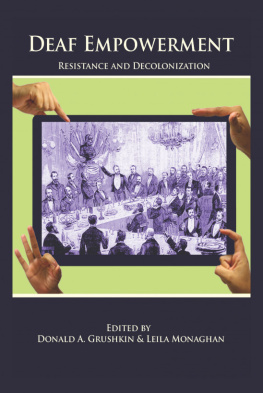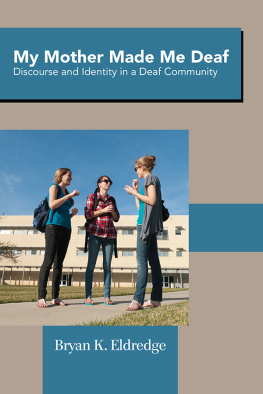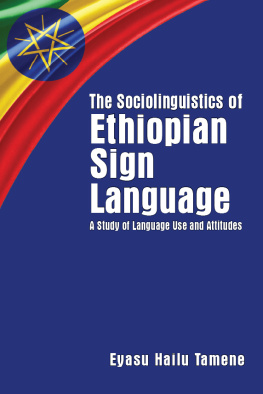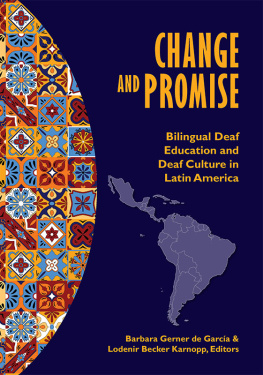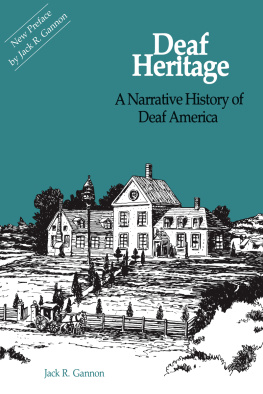DeafEmpowerment:
Resistance and Decolonization
Edited by Donald A. Grushkin
and Leila Monaghan
Contributions by
Donald A. Grushkin and Leila Monaghan
Erich Fox Tree
Donald A. Grushkin
Abigail Rosenthal
Anja Hiddinga and the
Beyond Hearing. Cultures Overlooked ResearchCollective
Joanne Weber
Ana Gediel and Molly Bloom
Kathleen L. Brockway and Donald A. Grushkin
Elm Academic Press
Laramie, Wyoming
2020
Deaf Empowerment: Resistance andDecolonization
Edited by Donald A. Grushkin and LeilaMonaghan
Elm Academic Press, a Division of Elm Books
Copyright 2020 by Elm Books
Paperback ISBN: 978-1-941614-34-1
E-Format ISBN: 978-1-941614-35-8
Smashwords Edition
Elm Academic Press
1175 State Highway 130 Laramie, WY 82070( http://elm-books.com )
Cover design by Lottie Patterson
Copy editing by Sarah Meacham and Alison QuagginHarkin
Index by Alison Quaggin Harkin
Formatting by BB eBooks
ALL RIGHTS RESERVED: This book may not be reproducedor retransmitted in any form in whole or in part without writtenpermission from the publisher, with the exception of briefquotations for book reviews or critical works. Thank you forrespecting the research products of the contributors to thisvolume.
Table of Contents
Acknowledgments I
Donald A. Grushkin
I would like to thank my co-editor, Leila Monaghan,for not only seeing the potential in the article which appears inthis book (see the Preface for details), but also providing me withthe opportunity to check off an item on my academic bucketlist to be an editor of an academic work. Serving primarilyas a guide, she allowed me to experience almost all phases andsteps that go into the creation of a work of this magnitude.
I would also like to thank my wife of nearly25 years, Theresa, for standing by my side and being the bestpartner and mother of my children one could have. Additionally, Iwould like to thank my parents, Beverly and Arnold Grushkin, forraising me to be an independent adult capable of thinking formyself, without which my own self-empowerment as a Deaf individualwould not have been possible.
On another note, I would like to thank thecontributors to this volume, not only for providing examples ofDeaf empowerment across all eras, nationalities and identities, butfor sticking it out with us through nearly four years of multiplerevisions and times when the project stalled due to conflicts inour work and personal lives.
Finally, I would like to thank the Deafcultural community, for ever exemplifying resistance to linguisticand cultural colonization, for their one thousand and onevictories great and small, without which this book wouldultimately be impossible.
Acknowledgments II
Leila Monaghan
This is the first publication of Elm Academic Press,an offshoot of a small regular press I started in 2012. I want tothank Donald Grushkin for being the ideal co-editor for thisproject. New enterprises are so often accompanied by naiveoptimism. Dons vision, patience, and persistence, however, arewhat turned the dream of a publication into a real book. I thankhim from the bottom of my heart for all his work with the authorsof this volume, for his editorial eye, for seeing possibilities inrough diamonds, and for his reminders about dealing with the beastwhen other concerns seemed to push this book off the front burner.I also want to acknowledge the help of Sarah Meacham and AlisonQuaggin Harkin in wrangling manuscripts into shape, and in Alisonscase, for doing our index. Also many many thanks for the keeninsights, patience and cooperation of all the authors, you have sovividly illustrated what Deaf empowerment looks like. Thanks alsoto former graduate assistant Meghan Boart for helping withorganizing manuscripts, and Lottie Patterson for her beautifulcover. Finally, a huge thank you to our international and verythoughtful reviewers including Antonio Jos Bacelar da Silva,Michelle Friedner, Mike Gulliver, Barbara LeMaster, Russell Rosen,and Beppie van den Bogaerde.
On a personal note, Id like to thank mypartner Bob for not only getting me through this book but cancertreatments and surgery as well. I have the power to edit onlybecause he has been feeding my body and soul. When Bob was not inFlagstaff to look after me, I was helped by friends and colleagesincluding Gary, Denise, Schenley, JoAnne, Joyce, and JaninaFenigsen, Chrissina Burke and Lisa Hardy. I was taken care of fromafar by family including Claire, Kirk, Tony, Dayna, my dad Charles,Noreen, Loretta, and Rita. From the affine side, many thanks toSandy, Cindy, Mike, Bob and Ann. A big shout as well to all myblood and adopted nieces and nephews. Thanks also to the staffs ofthe Mayo Clinic of Phoenix, the Arizona Oncology Clinic ofFlagstaff, and the Meredith and Jeannie Ray Cancer Center ofLaramie.
Preface
Donald A. Grushkin
The book you are about to read is not merely aboutDeaf empowerment. Beyond the obvious theme of presenting views andcase studies of Deaf empowerment from a variety of perspectives,including Deaf authors and voices, this book is anexpression of empowerment in itself. To explain, I need to sharethe story of how this book came about.
For manyyears, I had been frustrated in my attempts to get an earlierversion of what is now Chapter Three in this volume published in apeer-reviewed journal. One particularly frustrating (if notmaddening) attempt was when I submitted to a well-knownDeaf-focused journal. I knew this article had merit and offered aperspective that had not been seen before, so I was disheartened atthe overwhelmingly negative feedback. I felt the articles peerreviewers were not even willing to consider the merits of my workto encourage the development and sharing of a Deafcentric voicein the journal. This was compounded by a senior editors (who isalso Deaf) statement in the rejection letter that they did notbelieve this article would be of interest to the journalsaudience. I was astounded. A purportedly Deaf-focused journalbelieved that an article written from a strongly Deafcentricperspective on a topic which clearly relates to Deaf Studies wouldnot be of interest to its readers? To compound matters, a shorttime later this journal published a piece which was highly criticalof Deaf culture and the field of Deaf Studies. Upset at theseemingly arbitrary and yet audistic choices of the journal, Iengaged in some private discussions with the editor, at which timethey suggested the journal might hold a special issue exploring themeaning of Deaf Studies. Since I had been an inspiration for thisdecision, I thought I might be asked to serve as editor for thisspecial issue; however, another, better-known and established Deafindividual was chosen to lead this effort.
After tryingand failing again to get the article published with some Hearingjournals, I approached Leila Monaghan (who I have known for 20years since we were both on an American Anthropological Associationpanel that led to the creation of the book Many Ways to be Deaf:International Variation in Deaf Communities) for advice andsuggestions of journals that might be more receptive to publishingit. Leila asked me to send her the article for review, and, afterreading it, informed me she felt it would be appropriate forpublication within a new journal she was starting, calledLanguage, Culture & History. Furthermore, she suggestedthat she could devote a whole issue of the journal (which latermorphed into this book) to a topic on a Deaf-related theme. Aftersome back-and-forth, we agreed the theme would be DeafEmpowerment. And instead of taking the reins as editor of herjournal, she suggested that we work as co-editors of this SpecialIssue.
In establishing me as co-editor of thisbook, Leila exemplified the spirit of Hearing allyship to Deafcommunities. She took on an empowering role in several ways. First,instead of dismissing my work, she saw its potential and encouragedme to develop it along stronger lines (a strategy we both appliedtoward the work of some other contributors to this volume).Moreover, she stepped aside to allow for Deafcentric voices such asmine to come to the forefront of this work. Second, although sheretained control and final say over most publishing-relatedmatters, her role in this volume was one of guidance and support,outlining publication steps, serving as a second reviewer andproofreader, and discussing issues with me as they arose. Sheallowed me to gain the experience of editorship rather thanrelegating me to a supporting role. In so doing, she demonstratedanother aspect of allyship: encouraging and promoting thedevelopment of Deaf leadership. When my experience in the processof publishing this book is contrasted with my experience at theaforementioned journal, the barriers to Deaf empowerment are madeevident. Not only are Deaf people disempowered by the hegemonies ofaudism, but all too often, they are equally (and more insidiously)disempowered by people purporting to be advocates for Deaf peoples.Indeed, as Richard Katz (1983) points out:

